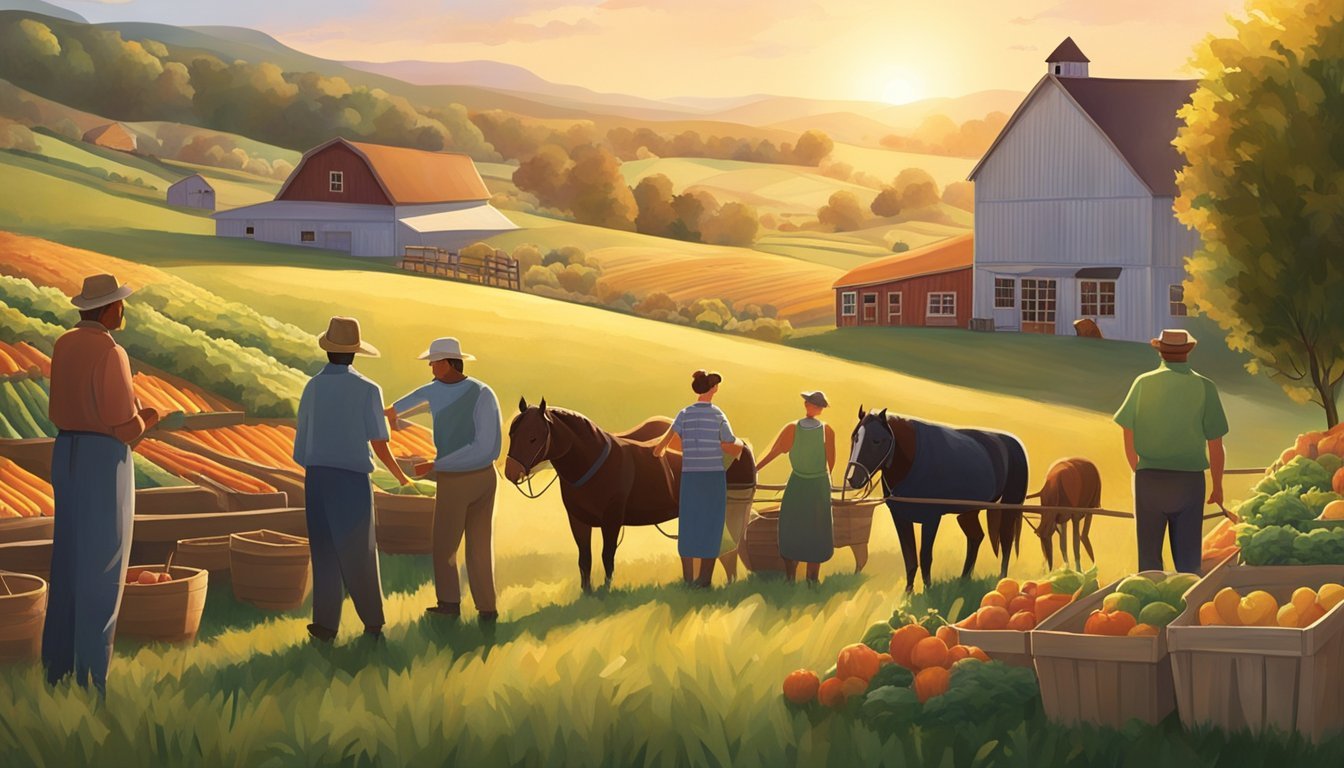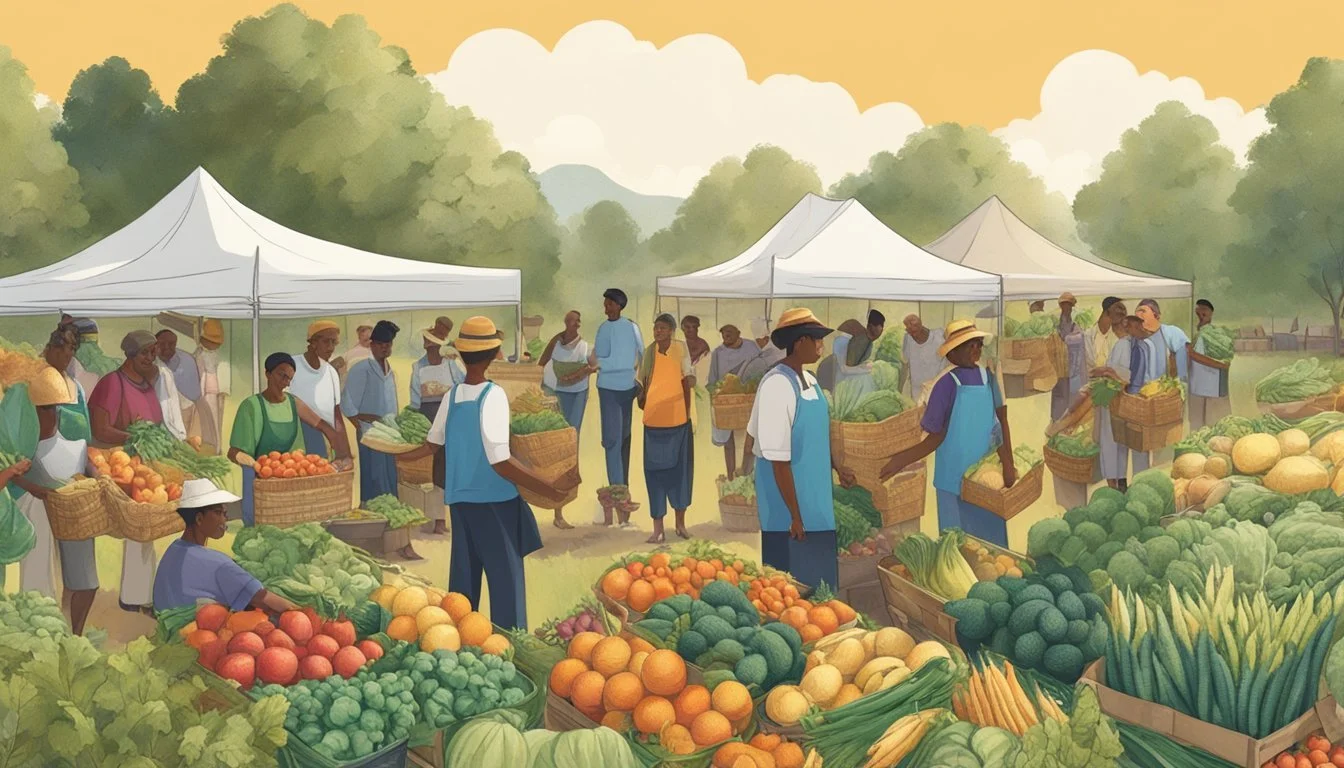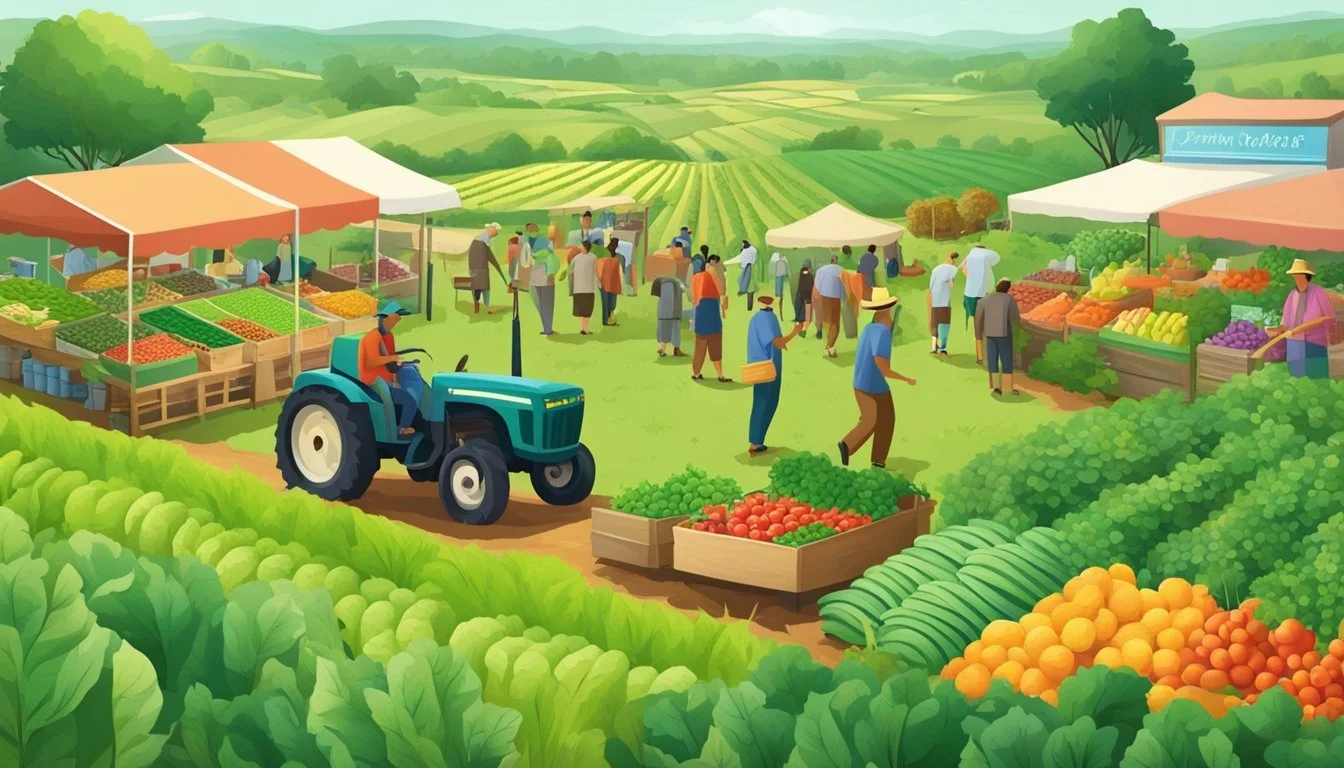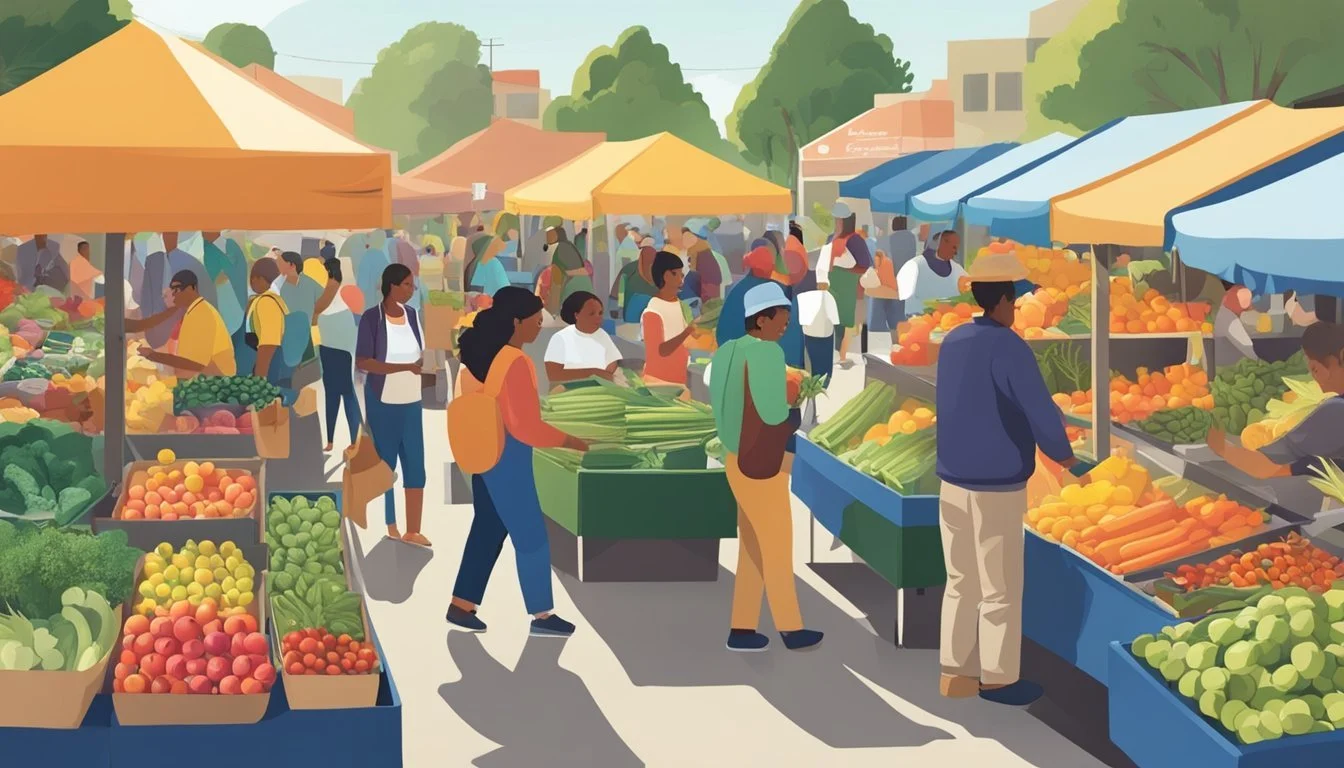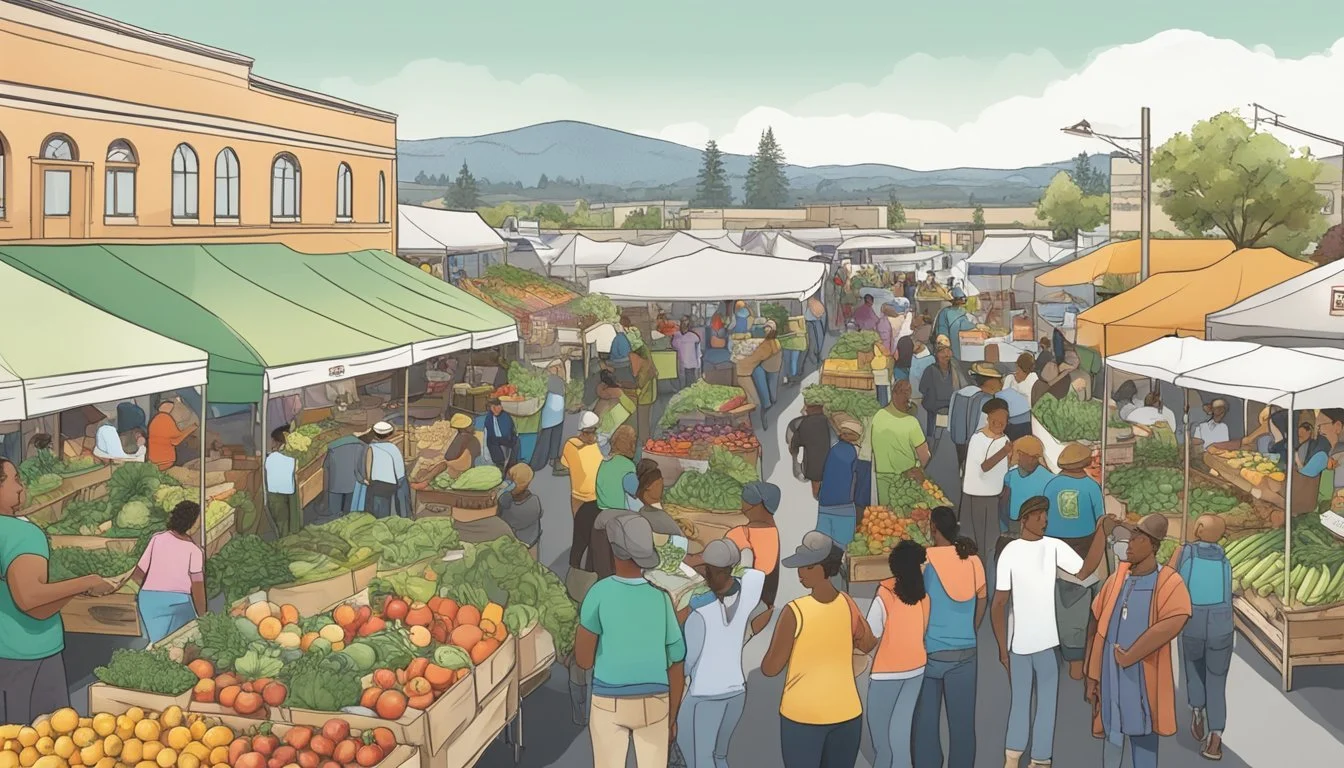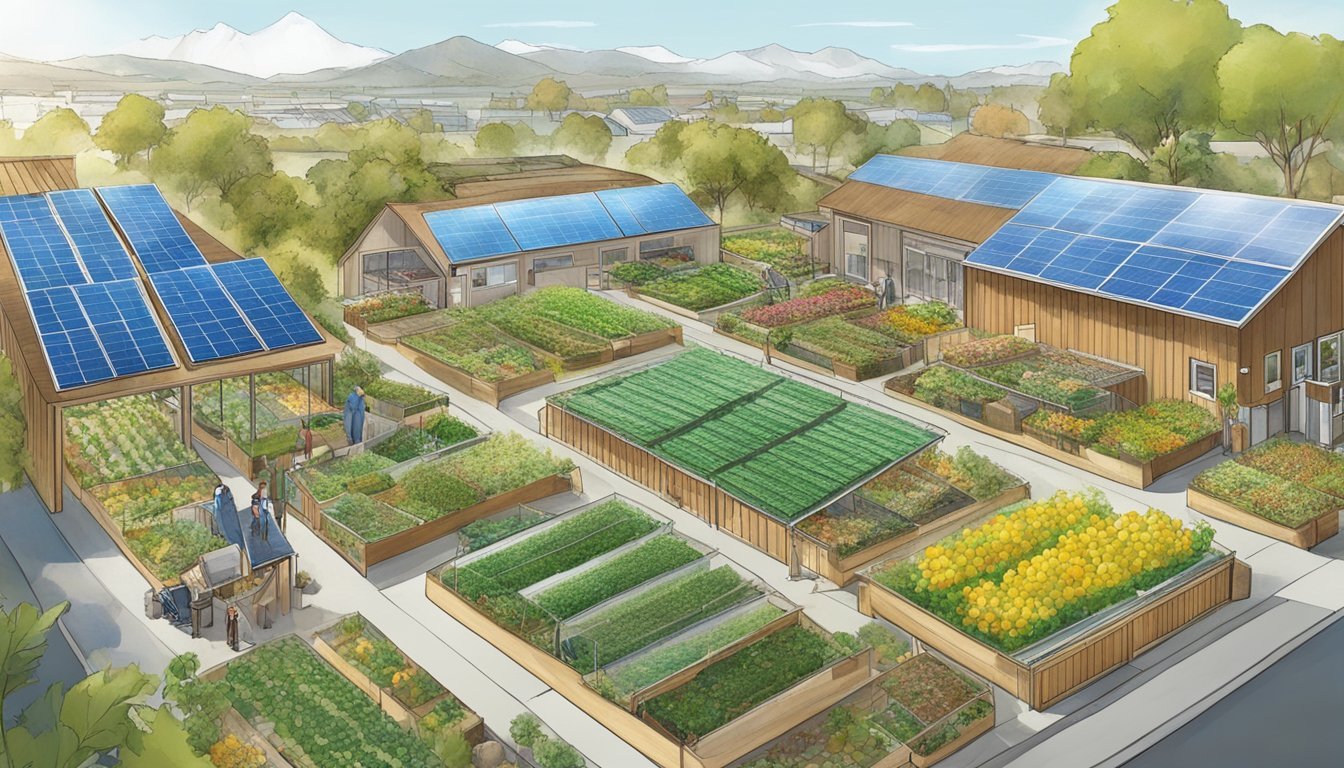Community Supported Agriculture (CSA) in Richmond, CA
A Guide to Fresh, Local Produce
Community Supported Agriculture, or CSA, is an innovative model for connecting local farmers with their surrounding communities in Richmond, California. Through CSA programs, Richmond residents subscribe to receive a regular share of the local harvest, which often includes a box of fresh, seasonal produce and sometimes other farm products. The mutual commitment ensures a stable market for farmers while providing consumers with nutritious, locally-grown food.
Urban Tilth, a Richmond-based organization, exemplifies the spirit of CSA in the area. By employing and educating local residents, Urban Tilth not only distributes fresh produce to the community but also nurtures a deeper connection between people and the land they live on. This symbiotic relationship between community and agriculture fosters a sustainable food system and contributes to the health and well-being of the Richmond area.
The vitality of such programs in Richmond is indicative of a broader movement toward sustainable and equitable food systems. CSAs like Urban Tilth's Farm to Table CSA offer tangible opportunities for residents to become active participants in that movement. By subscribing to CSAs, individuals directly support local agriculture and receive the benefit of fresh, high-quality produce while fortifying the community's resilience.
History and Development of CSA in Richmond, CA
The history of Community Supported Agriculture (CSA) in Richmond, California reflects a strong commitment to sustainability and community engagement. The narrative begins with passionate local residents and grows into a network of programs dedicated to fostering a sustainable food system.
Early Beginnings
CSA’s roots in Richmond can be traced back to the efforts of organizations like Urban Tilth, which emerged to train and empower residents in agricultural practices. They focused on growing food locally, thereby reducing the ecological footprint and rebuilding connections with the land. Initiatives like these laid the groundwork for CSA within Richmond by demonstrating successful community-managed agricultural practices.
Growth of CSA Programs
Over time, the success of early agricultural programs catalyzed the proliferation of CSA programs throughout Richmond. These programs work by allowing community members to support farms financially. In return, they receive a share of the farm’s produce, ensuring a supply of fresh and locally-grown products. By embracing the CSA model, Richmond has forged a community-based approach to agriculture, which continues to gain momentum, fostering a more robust and accessible sustainable food system.
Understanding CSA Models
Community Supported Agriculture (CSA) models in Richmond, CA, are diverse, catering to the varying needs of both producers and consumers. These models offer insight into the direct connection between the community and the process of food production, involving a structure of membership and share distribution.
Single Farm CSAs
A Single Farm CSA revolves around a direct, transparent relationship between a single farm and its members. Individuals or families become members by purchasing a share at the beginning of the growing season, which aligns their interests with those of the farm. This investment helps support the farm's operational costs up front, allowing the farm to plan production efficiently. In return, members receive a weekly or bi-weekly box of seasonal produce, creating a consistent market for the farmer and a source of fresh food for the consumer.
Cooperative CSAs
Cooperative CSAs represent a coalition of multiple farms, often with the aim to provide a broader variety of produce to their members than a single farm could. These collaborations enable farms to distribute the risk and provide a steady supply of produce even if one farm faces a challenging season. Members benefit from a diverse selection, which can include not only vegetables and fruits but also items like eggs, dairy, and meat, depending on the cooperation between different producers within the network.
CSA Networks and Associations
CSA Networks and Associations function as intermediaries that connect multiple CSAs with a wider base of consumers. They often handle logistics, marketing, and support, which can reduce the individual burden on farms. By forming a network, CSAs can reach a larger market and offer more pick-up points, making the system more convenient for members. These entities advance the CSA model by creating a stronger, more resilient local food system through collective effort and resource sharing.
Benefits of Joining a CSA
Joining a Community Supported Agriculture (CSA) in Richmond, CA, offers a multitude of benefits, ranging from health improvements through access to fresh, locally-sourced food, to economic and community gains. It fosters a sense of unity and supports a sustainable food system.
For Members
Members of a CSA enjoy the freshness and quality of locally grown produce, savoring foods at their peak flavor and nutritional value. Health is significantly impacted as members consume more fruits and vegetables. Additionally, members often have the chance to discover and try new produce items which they might not encounter at a typical grocery store. Economically, it is cost-effective as purchasing shares tends to be more affordable compared to buying similar organic products at market price.
Access to fresh, local produce
Improved nutritional intake
Opportunity for culinary exploration
Cost savings on organic produce
For Farmers
Farmers benefit from the financial security that comes with the CSA model. Receiving payment early in the season helps cover initial costs and mitigates some of the financial risks inherent in farming due to weather and market fluctuations. Furthermore, they establish a direct connection with their consumers, which can lead to a loyal customer base and valuable feedback on their produce selection and farming practices.
Financial security through pre-season payments
Risk reduction in agricultural yield
Direct feedback from consumers
Creation of a loyal customer foundation
For the Community
The community around Richmond, CA, thrives when a CSA is active in the area. A CSA helps to support the local economy by keeping money circulating within the community and by sustaining local employment. It also cultivates a sense of community, as members often engage with one another and with farmers. Lastly, by encouraging local, sustainable agriculture, CSAs contribute to the creation and maintenance of a sustainable food system.
Economic support for local businesses and farms
Enhanced community interaction and cohesion
Support for sustainable agricultural practices
CSA Membership and Subscription Details
In Richmond, CA, Community Supported Agriculture (CSA) is a practical approach for consumers to engage directly with local farms by subscribing to seasonal produce offerings, with various membership types and payment options available, including support for SNAP beneficiaries.
Membership Types
Members can choose from different types of shares, typically including a variety of vegetables and sometimes other farm products like eggs or meat. The farms may offer:
Full Shares: Suitable for families or those with a high consumption of fresh produce.
Half Shares: Ideal for individuals or smaller households.
Each share type reflects the amount of produce the member will receive throughout the subscription season.
Payment Plans and SNAP
Payment for CSA memberships is often required upfront, but some farms in Richmond offer payment plans to spread the cost over the season. Payment plans may be structured as:
Monthly payments
Bi-monthly payments
Payment upon delivery of each share
For members participating in the Supplemental Nutrition Assistance Program (SNAP), certain CSAs accept these benefits as payment, making fresh, local food more accessible to different segments of the population.
Subscription Season and Duration
The typical subscription season in Richmond aligns with the local growing period, which may vary but generally spans from:
May to October (around 20–22 weeks)
Customers commit for the duration of the growing season, ensuring they receive fresh, seasonal produce delivered regularly, either weekly or bi-weekly, depending on the farm's schedule and member's subscription choice.
Agricultural Practices in CSA
Community Supported Agriculture (CSA) in Richmond, CA, prioritizes environmentally responsible agricultural practices. By emphasizing the health of both people and the planet, CSAs in this region adopt methods such as organic farming, seasonal crop rotation, and other sustainable practices to maintain a viable and productive agricultural ecosystem.
Organic Farming
In Richmond, CSA farmers are committed to organic farming practices, foregoing synthetic pesticides and fertilizers. Instead, they utilize natural alternatives to maintain soil health and nurture organic produce. Composting, cover cropping, and the use of beneficial insects for pest control are common strategies. This approach ensures the production of high-quality, chemical-free crops that contribute to a sustainable food system.
Seasonal Crop Rotation
Seasonal crop rotation is integral to CSA farming in Richmond. By rotating a variety of seasonal produce, farmers can prevent soil depletion and break cycles of pests and diseases. They plant specific crops according to the season, which optimizes the health and productivity of the land. For example, a CSA might grow leafy greens in the spring, tomatoes and peppers in the summer, and root vegetables in the fall, effectively managing their land's resources.
Environmentally Sustainable Methods
CSA farms in Richmond employ environmentally sustainable methods to protect the ecosystem. Techniques like minimal tillage reduce soil erosion, while drip irrigation conserves water. Richmond CSAs strive for a closed-loop system that recycles nutrients and organic matter back into the earth. By doing so, they reinforce Richmond's reputation for advancing a sustainable food system that values both ecological balance and the community’s well-being.
Exploring the Produce and Products offered by CSA
Community Supported Agriculture (CSA) in Richmond, CA, serves as a seasonal gateway for residents to access a diverse array of farm-fresh products. Subscribers typically receive a weekly or bi-weekly veggie box containing a selection of items depending on the season and farm offerings.
Range of Vegetables and Fruits
CSA programs in Richmond provide a plethora of vegetables and fruits that vary by season. Spring may welcome leafy greens like spinach and kale, while summer brings a burst of flavor with tomatoes, peppers, and cucurbits such as cucumbers and zucchini. In fall, root vegetables like carrots and potatoes become abundant, and winter ushers in hardy staples like squash and cabbages.
Spring:
Leafy Greens: Spinach, Kale, Lettuce
Early Vegetables: Peas, Spring Onions
Summer:
Fruits: Berries, Stone Fruits
Vegetables: Tomatoes, Peppers, Corn
Fall:
Vegetables: Beets, Carrots
Fruits: Apples, Pears
Winter:
Root Vegetables: Potatoes, Winter Squash
Hardy Greens: Collards, Swiss Chard
Beyond Produce: Additional Farm Products
CSAs are not limited to produce alone. Many also offer a range of organic farm products. Subscribers might find farm-fresh eggs, artisan cheeses, or locally produced honey in their share. These items are often produced on the same farms or sourced from nearby producers to support the local food ecosystem.
Protein Products: Eggs, Cheese, Meats
Sweeteners: Honey, Maple Syrup
Artisan Items: Jams, Breads, Pickles
Richmond's CSA programs provide an excellent opportunity for residents to enjoy fresh, organic produce and an array of additional farm products, supporting sustainable agriculture and local farmers in the process.
Logistical Considerations
In Richmond, CA, community-supported agriculture (CSA) offers specific options for pickup and delivery to ensure freshness and convenience for various produce including citrus, beets, lettuce, and strawberries.
Pickup Locations and Delivery Options
CSA members in Richmond can collect their shares at designated pickup locations throughout the city. These spots are selected for ease of access and may include local farms, markets, or community centers. Detailed schedules are usually provided to members beforehand, detailing the days and times when produce such as citrus fruits and strawberries can be picked up.
Main Street Farm Stand: Tuesdays & Thursdays, 3 PM - 6 PM
Community Center: Saturdays, 10 AM - 1 PM
For added convenience, several CSAs in Richmond offer delivery options directly to the member’s door. Delivery often comes with an additional fee, but it ensures that items like lettuce and beets arrive fresh.
Doorstep Delivery: Available on Wednesdays (Small fee applies)
Workplace Delivery: Select employers offer on-site delivery for their employees
Packaging and Storage
When it comes to packaging, many CSAs choose eco-friendly materials to store their produce like lettuce and beets. They use materials that maintain the freshness of the produce while being mindful of the environmental impact.
Reusable containers: Encourages members to bring their containers
Recycled boxes: Provides boxes made of recycled material for a fee
Storage recommendations are often provided to ensure the longevity of perishable items like citrus and strawberries. CSAs generally guide members on how to best keep these items fresh after pickup or delivery.
Citrus: Cool, well-ventilated area away from direct sunlight
Strawberries: Refrigerated; consume within a few days of pickup
Seasonal and Weather Impacts on CSA
Community Supported Agriculture in Richmond, CA, contends with the challenges and opportunities presented by the region's distinct seasons and varied weather patterns. These factors heavily influence crop selection and harvest timings.
Adapting to Weather Variability
CSA programs in Richmond must strategize effectively to manage weather variability. Richmond experiences a Mediterranean climate with dry summers and mild, wet winters. In response, farmers typically adjust planting and harvesting schedules to mitigate potential weather-related disruptions. For example, an unexpected heavy rain during the summer can force an expedited harvest to prevent crop damage, whereas drought conditions may require the implementation of water-saving irrigation techniques like drip systems to ensure crops do not suffer from water stress.
Strategies for weather variability:
Shift planting dates
Select drought-resistant varieties
Implement water-saving irrigation techniques
Expedite harvests in anticipation of inclement weather
Seasonality and Crop Selection
Seasonality dictates the types of crops that can be grown and when they can be harvested. Spring might feature leafy greens and herbs, summer brings tomatoes and peppers, fall offers root vegetables, and winter is suitable for hardy brassicas. Richmond CSA farmers carefully plan their crop selections to align with the natural growing seasons, ensuring a timely harvest and a steady, diverse offering of seasonal produce for CSA shareholders.
Typical Richmond CSA seasonal produce:
Spring: Arugula, spinach, and cilantro
Summer: Zucchini, eggplant, and basil
Fall: Carrots, beets, and kale
Winter: Broccoli, cauliflower, and collards
To ensure a diverse supply of produce throughout the year, crop rotations and succession planting are often employed, allowing for a continuous cycle of harvest regardless of the season. This careful selection and timing maximize crop yield and quality, contributing to the sustainability and success of the CSA model.
Community Engagement and Education
Community engagement and education serve as the backbone of Community Supported Agriculture programs in Richmond, CA. These initiatives aim to empower local residents with knowledge about sustainable agriculture, and how to incorporate fresh, local produce into their daily lives.
CSA as an Educational Tool
Community Supported Agriculture programs not only provide residents with fresh, locally-grown produce, but they also serve as powerful educational tools. They educate community members about where their food comes from and the importance of sustainable farming practices. For example, Urban Tilth's Farm to Table CSA program operates at the North Richmond Farm, where the organization has an immediate opening for a Community Engagement Specialist. This role is crucial in enhancing the educational aspect of the CSA, ensuring that community members receive valuable information about the benefits of consuming locally sourced food and supporting local agriculture.
Creating a Local Food Culture
By actively engaging community members through events and educational materials, these CSA programs play a pivotal role in creating a local food culture in Richmond. They foster an appreciation for farm-to-table eating and encourage the use of fresh produce in creating healthy recipes. Community engagement events associated with these programs offer opportunities for residents to learn more about the seasonal fruits, vegetables, herbs, and other goodies available in their area. Moreover, programs like Urban Tilth's CSA "Veggie Box" Projects not only disseminate fresh produce but also provide education on how to use these items to create nourishing meals that celebrate local flavors and traditions.
Marketing and Outreach Strategies
In the context of Richmond, CA, the marketing and outreach strategies of a Community Supported Agriculture (CSA) program are pivotal for its success and sustainability. Understanding the local demographic's online engagement and event participation can distinctly influence the CSA's growth.
Utilizing Online Platforms and Local Food Directories
Richmond's CSA organizers are leveraging online platforms to reach a wider audience. They create informative and visually appealing content on social media to showcase their produce and the benefits of subscribing to their services. Moreover, they list their CSA on local food directories, integrating application programming interfaces (APIs) to facilitate real-time updates and easy customer access. This approach not only boosts their visibility but also encourages community members to explore locally-sourced food.
Partnerships and Local Events
Strategic partnerships with local businesses and organizations have proven effective in strengthening Richmond's CSA's market presence. By collaborating with eco-friendly stores, wellness centers, and local schools, CSAs tap into existing networks of potential subscribers. Additionally, participating in local events, such as farmers markets and sustainability fairs, allows CSAs to physically engage with the community, provide tactile experiences with their produce, and forge lasting relationships.
Innovations and Future of CSA in Richmond
Community Supported Agriculture in Richmond is embracing innovations through networks and technology to offer tailored services that meet the evolving needs of its consumers.
CSA Innovation Network
The CSA Innovation Network serves as a fundamental hub for the dissemination of best practices and new ideas within the Community Supported Agriculture space. The network focuses on ideation and knowledge-sharing, with an objective to advance the CSA model and make it a keystone in local food systems. Richmond's agricultural stakeholders are part of this collaborative effort, ensuring that local CSA programs are both innovative and reflective of community needs. They are intricately involved in the network to drive the growth of CSA, fostering the evolution of the food system to be more community-centric and sustainable.
Customizable CSA Shares and Technology
Customization is a critical trend in Richmond's CSA scene. CSA providers now offer more adaptable subscription options to fit diverse lifestyles and preferences. This customization extends to:
Delivery Schedules: Consumers can align their CSA deliveries with their personal schedules, enhancing convenience and reducing food waste.
Data Integration: Using technology to track consumer preferences, Richmond’s CSA providers are leveraging data to refine their offerings and increase satisfaction.
Technology plays a prominent role in how CSA shares are managed and distributed. With innovative software platforms, CSA operations in Richmond can offer a more personalized experience, enabling consumers to amend their subscription preferences, select specific produce, and manage delivery options with ease. Such tech-driven improvements not only streamline the process for consumers but also help farmers in planning and inventory management, ensuring a sustainable future for the CSA model.

